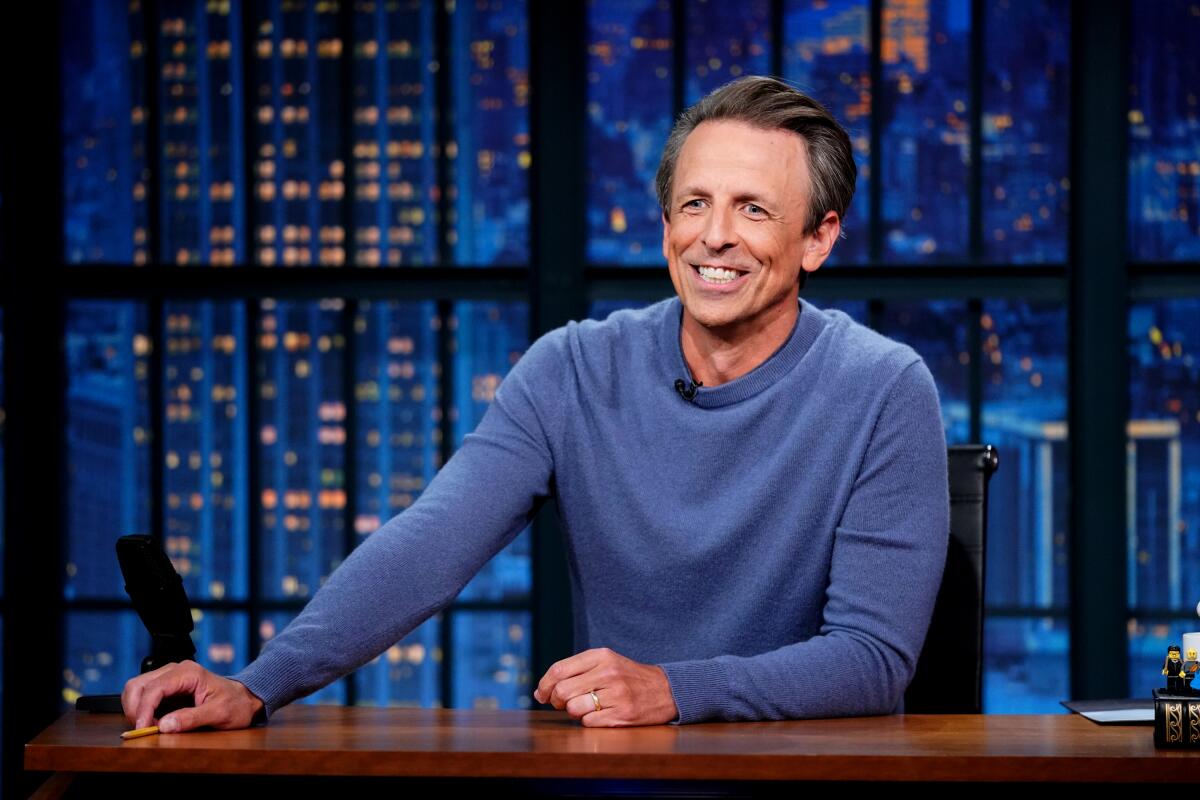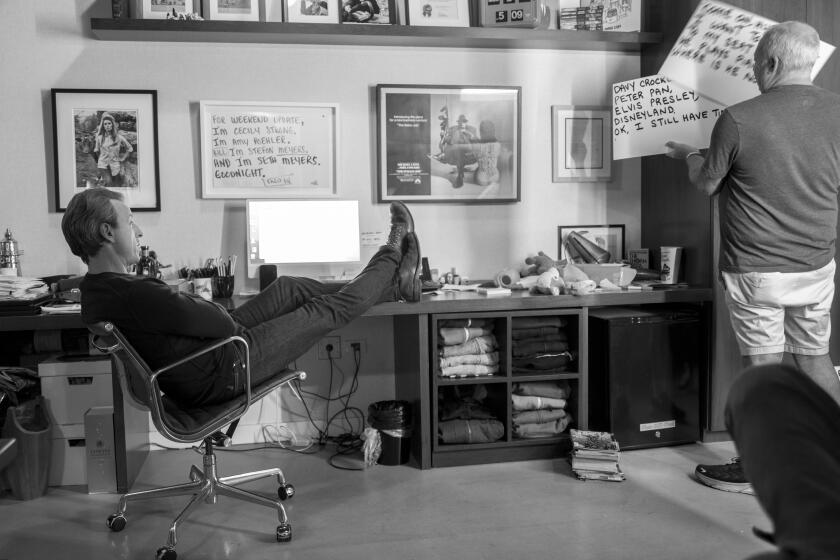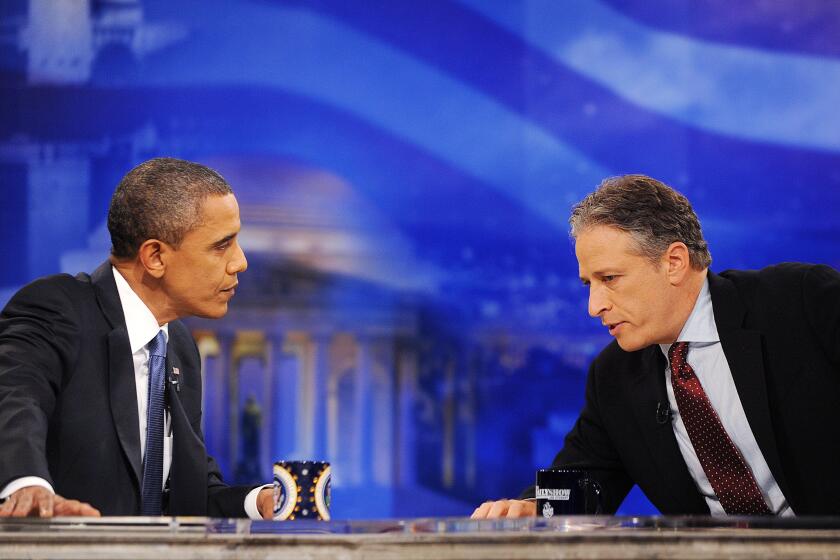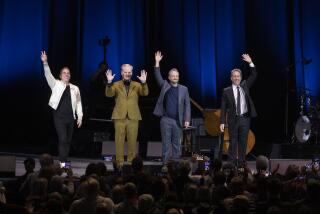Seth Meyers’ prime-time special will draw on his standout feature, ‘A Closer Look’

- Share via
Tonight, if you’re reading this on Tuesday, there will be a debate between presidential candidates Kamala Harris and Donald Trump. (If you’re seeing this afterward, mentally shift the verbs into the past tense.)
And where the nation goes in fraught times, comedy, its analytical antidote, will follow. Jon Stewart, who usually hosts “The Daily Show” on Monday nights, will move over to Tuesday for a live post-debate edition, signifying both the event’s importance and, institutionally, his own. And Seth Meyers, whose “Late Night” is arguably the most politically focused late-night show after “The Daily Show,” will jump to an earlier time slot on Wednesday for “A Closer Look Primetime” special, airing at 10 p.m. on NBC and streaming the following day on Peacock.
Late-night television, which only exists on so-called “linear” TV, is that medium at its most freewheeling, and the later one goes the freer it wheels. Post-midnight late-late night, where Meyers works, following Jimmy Fallon’s “Tonight Show,” is where Craig Ferguson’s toss-the-cards talk show flourished, where Conan O’Brien established his individual brand of weirdness following David Letterman’s own brand of weirdness, and a smoke-wreathed Tom Snyder held court with guests from Marlon Brando to Charles Manson and Patti Smith to James Baldwin.
With the writers’ strike lifted, The Times went behind the scenes with Seth Meyers and his team preparing for their first ‘Late Night’ in five months.
That one had to stay up past most people’s bedtime to watch them then, before the internet exploded the TV schedule, gave these shows a clubhouse, niche feel and their self-selecting audience the sense of being in on something special and, relatively speaking, out of the mainstream. In their genial way, they’re the punk clubs of television.
All late-night shows are at least superficially political in that monologues are written off of current events. A new Rolling Stone article, cited Monday night by Jimmy Kimmel and Stephen Colbert in their monologues, notes that, according to a source, Trump has wanted to “punish late-night comedians for giving ‘illegal’ campaign contributions to the Democratic Party in the form of jokes and on-air satire.” (“Finally I made an enemies list,” said Colbert, whose broadcasts from Chicago during the Democratic National Convention were essentially a celebratory after-show. “There’s no guarantee I’ll be arrested, but it’s an honor just to be nominated.”)
Trump isn’t wrong that he’s been the butt of much of late-night humor, but there are reasons for that — he’s an absurd person who lies compulsively, spouts ridiculous conspiracy theories and otherwise impeaches himself every other time he opens his mouth. And as he’s been contriving, or conniving, to be president again since he lost the last election, and in court for much of that time, he’s a target that’s impossible to miss, hard to ignore — and not least, not hard to imitate.
Of all the late-night hosts, Meyers, who took over “Late Night” a decade ago when Fallon went to “Tonight,” is currently my favorite, which is to say I get what I need from him. In the lockdown phase of the pandemic, broadcasting from the attic of his Connecticut vacation home, with a mysterious copy of “The Thorn Birds” on a side table, a painting of a sea captain for a sidekick and his children running through, fit his casual air. It made sense that he left the suit and tie in the closet when he returned to the studio — he’s the only talk show host still working in the unbuttoned 12:30 a.m. slot. (CBS’ “After Midnight,” with Taylor Tomlinson, is a game show, not a talk show.)
Though streaming and social media have upended how viewers consume late-night series, innovation on the shows themselves has been much more stagnant.
If you’ve watched “Late Night” for any length of time, you’ve met the rest of his family, including an episode of the alcohol-fueled “Day Drinking” where his mother out-drinks him. The very model of a smart regular guy, even after years of hosting “Weekend Update” on “Saturday Night Live” (where he was also head writer), he somehow seems to have stumbled into a role he’s nevertheless perfectly suited for. With Meyers’ nods to the writers, exchanges with cue card guy Wally Feresten, an ability to turn interviews into conversations and a tendency to laugh incredulously at his own material or delivery, “Late Night,” like Ferguson’s late-lamented “Late Late Show,” has an air of being anti-professional and intimate, of being something happening in real time, made by humans.
The standout feature of “Late Night,” imported into Wednesday’s special, is “A Closer Look,” an extended, fact-filled riff on a specific bit of news, which Meyers delivers at breakneck speed and which, much like Stewart at “The Daily Show” and John Oliver at “Last Week Tonight,” combines amusement, astonishment, rage and horror, while also being extremely funny; Meyers wants you to laugh, but he also wants everyone to wake up. NBC is betting that some not insignificant portion of the huge audience for the debate will want somewhere to turn afterward, for context, relief, a good time and some straight-shooting.
Comedy writers, whose job it is to find the truth in the joke and the joke in the truth, are more reliable guides to the times than the prognosticating pundits of Sunday morning and cable news programs. (They are not, they will tell you, journalists.) Of course, if satire could save the world, the Onion wouldn’t still be repeating its 2014 mass-shooting headline, “‘No Way to Prevent This,’ Says Only Nation Where This Regularly Happens” (37 times as of Sept. 4). But as individuals, it can get us through one day and into the next, by giving a voice to our outrage that makes us laugh in the bargain.
More to Read
The complete guide to home viewing
Get Screen Gab for everything about the TV shows and streaming movies everyone’s talking about.
You may occasionally receive promotional content from the Los Angeles Times.









